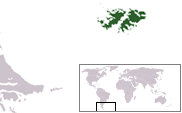Falkland Islands Wolf
| Falkland Islands wolf | |
|---|---|
 |
|
| Illustration by John Gerrard Keulemans (1842–1912) | |
| Scientific classification | |
| Kingdom: | Animalia |
| Phylum: | Chordata |
| Class: | Mammalia |
| Order: | Carnivora |
| Family: | Canidae |
| Tribe: | Canini |
| Genus: | †Dusicyon |
| Species: | †D. australis |
| Binomial name | |
|
Dusicyon australis (Kerr, 1792) |
|
 |
|
| Location of the Falkland Islands | |
The Falkland Islands wolf (Dusicyon australis), also known as the warrah and occasionally as the Falkland Islands dog, Falkland Islands fox, or Antarctic wolf, was the only native land mammal of the Falkland Islands. This endemic canid became extinct in 1876, the first known canid to have become extinct in historical times. It was the only modern species in the genus Dusicyon.
Traditionally it had been supposed that the most closely related genus was Lycalopex, including the Culpeo, which has been introduced to the Falkland Islands in modern times. However, in 2009, a cladistic analysis of DNA identified the Falkland Island wolf's closest living relative as the maned wolf (Chrysocyon brachyurus)—an unusually long-legged, fox-like South American canid, from which it separated about 6.7 million years ago.
The Falkland Islands wolf existed on both West and East Falkland, but Charles Darwin was uncertain if they were differentiated varieties. Its fur had a tawny colour and the tip of the tail was white. Its diet is unknown, but, due to the absence of native rodents on the Falklands, probably consisted of ground-nesting birds such as geese and penguins, grubs and insects, as well as seashore scavenging. It has sometimes been said that it may have lived in burrows.
The first recorded sighting was by Capt. John Strong in 1690. Captain Strong took one of the animals on his ship, but during the voyage back to Europe the creature became frightened by the firing of the ship's cannon and jumped overboard.Louis Antoine de Bougainville, who established the first settlement in the Falkland Islands termed it a loup-renard ("fox-wolf"). The name "warrah" is a corruption of the term aguará (meaning "fox" in Guaraní, a Native American language), because of its similarity to the maned wolf ("aguará guazú".) The warrah's Latin name translates into "foolish dog of the south", because of its apparent lack of fear of people.
...
Wikipedia

